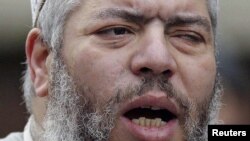Radical Muslim cleric Abu Hamza al-Masri and four other terrorism suspects who fought for years to avoid facing charges in the United States appeared in U.S. courts Saturday, hours after being extradited from Britain.
Hamza faces charges that include conspiring to set up a terrorist training camp in the northwestern U.S. state of Oregon and facilitating violent jihad in Afghanistan. The Egyptian-born former imam also is accused of helping abduct 16 Western tourists in Yemen in 1998 - an incident that saw four of the hostages killed.
Hamza was informed of the charges against him in federal court in New York Saturday, but will not be formally arraigned until Tuesday. Also appearing in the New York court Saturday were Adel Abdul Bary and Khaled al-Fawwaz, who pleaded not guilty to charges they were involved in the deadly 1998 bombings of the U.S. embassies in Kenya and Tanzania.
Two more defendants, Babar Ahmad and Syed Talha Ahsan, pleaded not guilty Saturday in a federal court in New Haven, Connecticut to charges they supported terrorists through websites they ran. They are accused of providing terrorists with cash, recruits and equipment.
U.S. attorney Preet Bharara called the extraditions "a watershed moment" in the nation's efforts to eradicate terrorism.
All five of the British citizens arrived in the United States early Saturday. The men were flown to the United States after the British High Court rejected their last-minute appeals. They had raised legal questions about human rights and prison conditions they expected to face in the United States. In rejecting the appeals, the British court cited an "overwhelming public interest" in seeing the extraditions carried out.
Ahmad's father, Ashfaq Ahmad, was among a group of protesters gathered outside the court Friday. He made a speech saying his son's extradition would be "forever remembered as a shameful chapter in the history of Britain."
"The system has let me down in a manner more befitting of a third world country than one of the world's oldest democracies," he said.
Ashfaq Ahmad also told reporters that while he now fears for his son's well-being, the final ruling came as no surprise.
Both British and European courts had earlier ruled in favor of the extraditions, triggering the appeals that were rejected Friday.
Some information for this report was provided by AP, AFP and Reuters.





